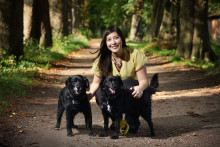Your PhD research focuses on animal protection policies in Mexico. What was your main research question?
Norma Contreras Hernandez: ‘I’ve been looking at new animal protection regulations in Mexico and seeing how successful they were. I wanted to see how well they were being implemented and if they created social awareness about animals and animal protection.’
During our first interview, you mentioned that animal rights was a new topic in Mexico. How has this evolved over the years?
‘That is not the case anymore. Animal welfare and protection have gained importance over the past years. People are becoming more aware of animals and that they deserve respect. I’ve been an animal advocate for twenty years. When I became involved in the topic, I could not even say to people that they could “adopt” an animal. At that point, you could not really adopt a dog. It’s totally different now. Animal adoption is a normal thing. Having vegetarian and vegan options in restaurants is becoming standard, at least in bigger cities. Pet friendly places are quite common, while they were unheard of a few years ago.’
Are you still an ‘active’ animal activist?
‘I am. For example, I’ve been involved in trying to ban bull fights in one state. The bill didn’t go through, but it was a close vote and we will try again. Some states want to preserve bull fighting as cultural heritage, but we believe that heritage should not be connected to animal mistreatment. During such a fight, you essentially torture the bull until you kill it. According to polls, we also know that most of the society is against these fights.’

What type of animal rights regulations have you included in your research?
‘There are top-down regulations, which are coming from the government, and bottom-up regulations driven by animal activists demanding change. I’ve concluded that top-down regulations are easier to create, but have less impact. Bottom-up policies don’t always make it to law, but they do stir awareness. Even though they might not achieve everything, they achieve more than the top-down rules. When it comes to bottom-up initiatives, activists have been fighting against bull fights, cock fights, the use of animals in circuses and religious festivities, and animals used for pulling carts. The issue is that many of these are culturally embedded practices, so some people want to preserve them.’
Can you summarize the main findings of your PhD work?
‘Creating animal advocacy networks is key in developing countries like Mexico. It’s important that organisations join their efforts and resources, so that they achieve more. With social media it is easy to gather and fight together no matter where you are. I also found out that if animal activists aren’t involved in implementing the new regulation, it has a very limited impact. Without activists, the implementation just doesn’t happen because it is still seen as a secondary topic. The main conclusion would be that the social and political process of establishing a regulation can lead to a bigger social change than the regulation itself.’
What are your plans now? How do you plan to use your PhD thesis?
‘I will continue teaching social sciences at university back home in Mexico, but I’d definitely like for my thesis to be useful. The idea is to make it accessible to animal protection organizations in Mexico. There are currently over one hundred animal protection NGO’s working together. I want to present it to them and use it as a sort of ‘guide book’ when approaching the government.’
Why is the topic of animal rights so important to you?
‘As part of a sustainable strategy of any country, animals should be respected and protected. It relates to sustainable development, but also to preserving peace. Whoever mistreats animals, is unlikely to stop there. It often leads to more violence. On top of that, animal wellbeing is of course important. Animals can’t advocate for themselves, but I can be their voice.’







